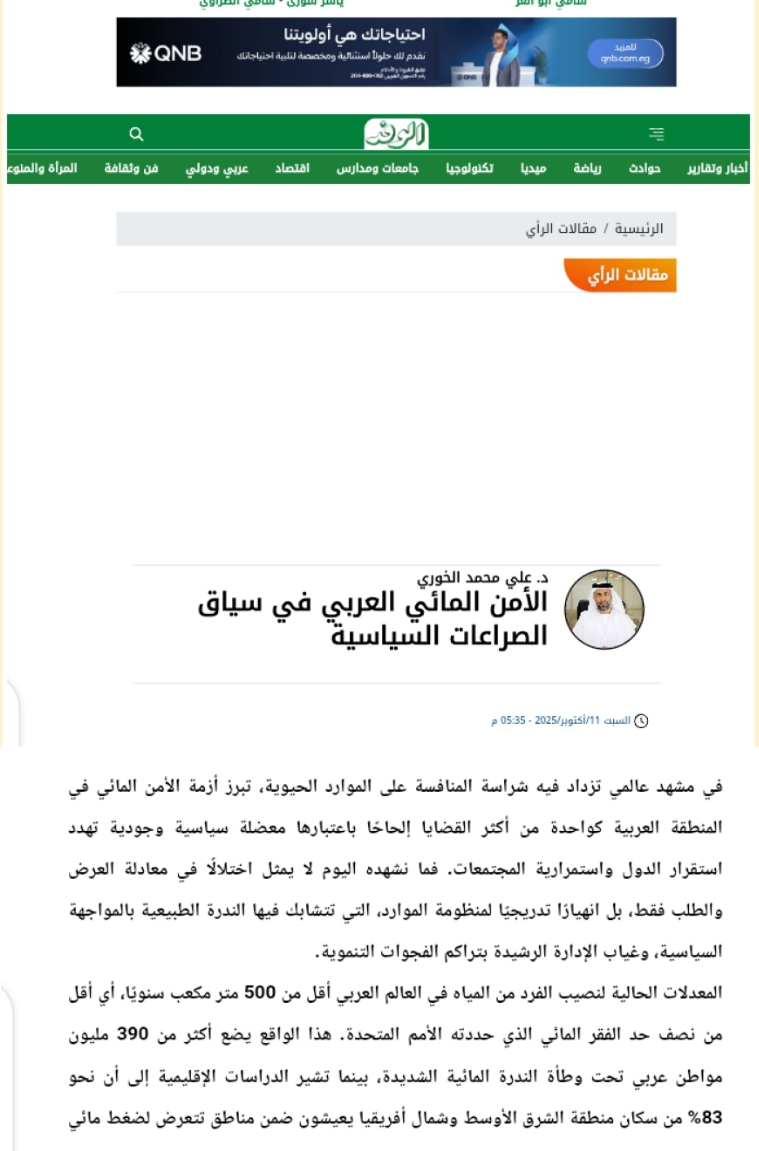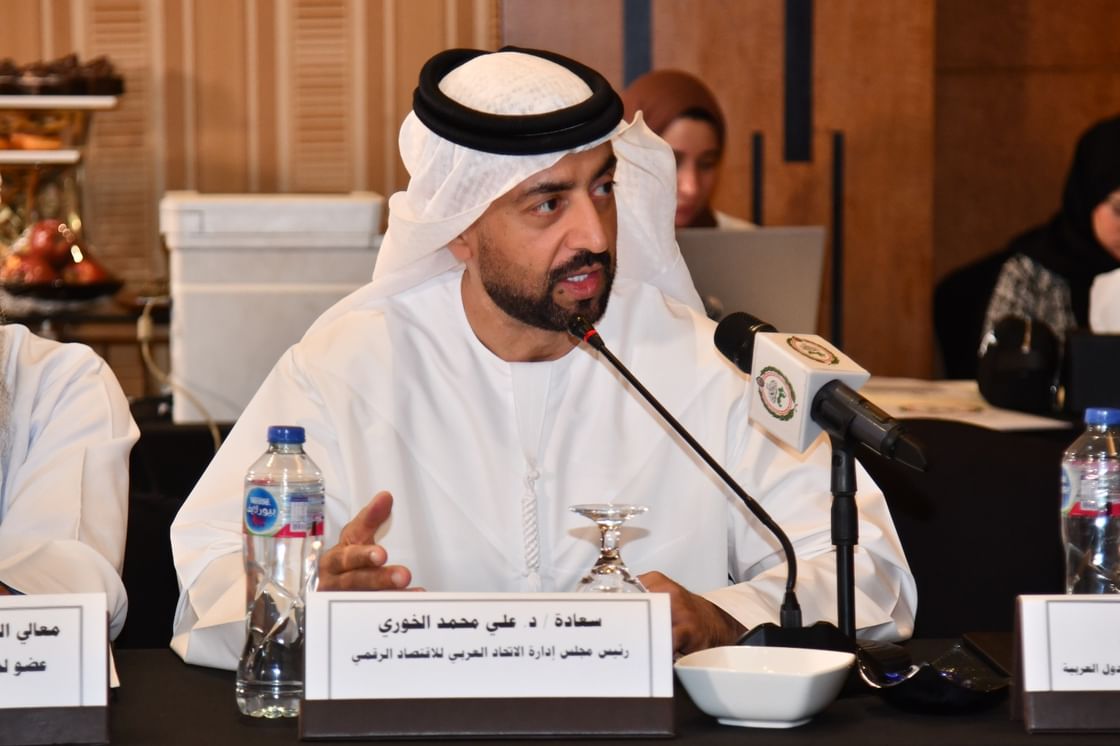Cairo
Source: Al-Wafd Newspaper
Prof. Dr. Ali Mohammed Al-Khouri
In a global landscape increasingly characterized by fierce competition for vital resources, the water security crisis in the Arab region stands out as one of the most pressing issues, representing an existential political dilemma that threatens the stability of states and the continuity of societies. What we are witnessing today is not merely an imbalance in the supply and demand equation, but a gradual collapse of the resource system, where natural scarcity is intertwined with political confrontation, and the absence of good governance is compounded by the accumulation of developmental gaps.
Current per capita water availability in the Arab world is less than 500 cubic meters annually, less than half the water poverty line defined by the United Nations. This reality places more than 390 million Arab citizens under severe water scarcity, while regional studies indicate that approximately 83% of the population in the Middle East and North Africa live in areas experiencing extremely high water stress. With global water demand projected to increase by up to 25% by the middle of this century, the Arab water crisis is becoming a countdown to a water crisis that could disrupt national and social security balances in more than one Arab country.
The Arab crisis is not solely due to a dry climate or natural scarcity; its danger lies in what can be termed the “politicization of hydropolitics,” that is, the transformation of water into a tool of geopolitical pressure. Arab dependence on external water sources, whether in the Nile Basin or the Tigris and Euphrates rivers, has placed countries like Egypt, Iraq, and Sudan in a state of perpetual strategic vulnerability. When massive dams are built without consensus, and when river flows are unilaterally regulated, water sovereignty becomes hostage to the political will of upstream states, and water is transformed from a shared resource into a tool of geopolitical blackmail.
At the same time, collective Arab efforts on the water issue remain limited and unable to create an effective negotiating framework that guarantees even the minimum of historical and geographical rights. This is due to the limited effectiveness of joint Arab institutions in this field, coupled with the lack of the necessary political consensus to build a unified negotiating position, within a regional climate that still needs to strengthen trust and expand cooperation. These factors have contributed to slowing down the achievement of sustainable agreements on water resource sharing.
The water crisis is closely linked to food security, as Arab agriculture relies almost entirely on irrigation. This means that any water shortage translates directly into a decrease in agricultural production and, consequently, an increase in food import bills. This dependence exacerbates the fragility of many Arab economies, making them more vulnerable to external fluctuations, which poses an indirect threat to the stability of societies, particularly in light of steady population growth, accelerating climate change, and the declining ability of states to control food costs.
From an economic perspective, the funding gap represents a major obstacle to improving water infrastructure, which is often dilapidated or destroyed by armed conflict. International estimates indicate that achieving the Sustainable Development Goals related to water requires investments of approximately $114 billion annually globally, while most Arab countries lack the capacity to secure this type of long-term expenditure. The costs of operation, maintenance, and reconstruction of war-damaged infrastructure further exacerbate the predicament and reveal a structural crisis in development priorities.
Despite the challenges, Arab countries can still rebuild their water management approach on scientific and institutional foundations. There are real opportunities to restructure water management by localizing technologies related to desalination and wastewater treatment, developing distribution networks based on efficiency rather than expansion, and adopting smart irrigation methods that reduce losses and increase productivity without depleting groundwater reserves.
It is also possible to work on formulating regional cooperation mechanisms based on practical coordination in the management of shared water resources, by combining tangible technical solutions, such as sharing flow data and managing dams, with well-thought-out negotiation paths based on clear rules, in a way that ensures respect for national sovereignty on the one hand, and paves the way for building sustainable mutual interests on the other.
Conversely, the water solution cannot be separated from the political solution. Settling existing disputes between neighboring countries and activating channels of preventive diplomacy paves the way for the necessary water agreements. Arab official action should move beyond political statements and public declarations to organized institutional action by activating the role of relevant ministerial councils and establishing effective diplomatic mechanisms to address transboundary water disputes within a legal and regional framework supported by international sponsorship that guarantees a minimum level of neutrality and fairness in the sharing of common resources.
It is also essential for Arab states to embrace the concepts of water governance, meaning the sound management of resources to ensure a balance between supply and demand, and to link urban and agricultural planning decisions and environmental policies with an integrated, rather than fragmented, approach. Water management should not remain the sole domain of ministries of water and irrigation, but must be a sovereign matter that transcends all sectors.
Securing the Arab water future is an existential necessity that requires activating the tools of the modern state, moving beyond traditional frameworks, and working at all levels; from societal awareness to scientific innovation, and from regional negotiation to urban planning. Unless the concept of water security is redefined as a pillar of comprehensive national security, the region will remain vulnerable to recurring cycles of drought, the depletion of environmental capital, and the loss of sovereignty over development decisions.
The water crisis in the Arab world is one of the clearest indicators of the gap between structural challenges and institutional capacities to address them. It stems from the absence of a unified management model capable of treating water resources as a strategic interest that transcends national interests and circumstantial considerations.
The region needs a genuine shift towards water policies based on accurate data, binding regional partnerships, and long-term, nationally managed plans. What’s required is not just increased investment in infrastructure, but a redefinition of water as a central element in the equation of national stability. Without water security, there can be no food security, no economic development, and not even social stability.
Delaying the restructuring of Arab water policies will lead to a higher opportunity cost and leave countries facing a more complex and less controllable reality. In a world where conflicts over essential resources are escalating, it is no longer acceptable for water to remain a marginal issue in decision-making centers.
The future of Arab water resources will not be shaped by repeating the existing traditional approach, but rather by a radical review that begins with the recognition that resource management is no longer a technical matter, but a sovereign issue requiring a comprehensive political, legal, and institutional solution. This is the true test for the Arab state in the 21st century.











